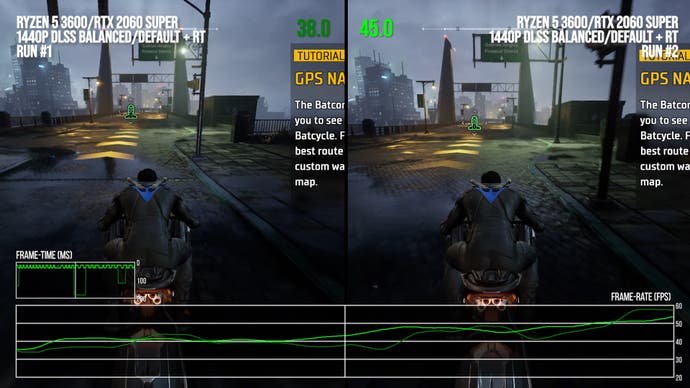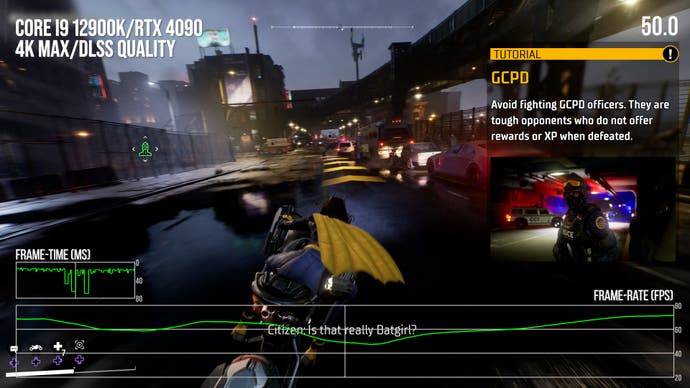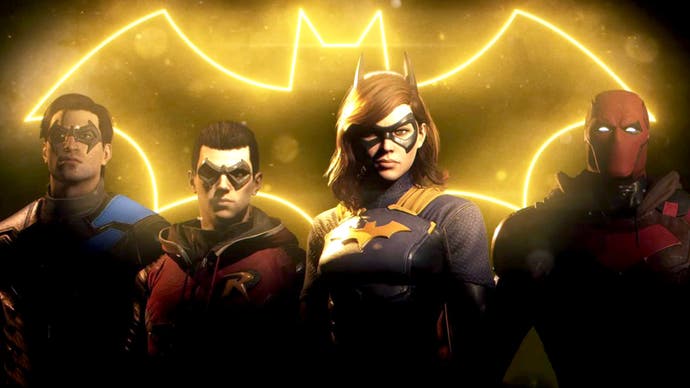Gotham Knights PC: can its severe problems explain poor console performance?
Even a Core i9/RTX 4090 rig can drop beneath 60fps.
Gotham Knight's performance woes on consoles continue to cause controversy, with many worried that it's the first title to signal a resurgence in 30fps gaming for the latest console hardware. The PC version - with its adjustable settings, hardware monitoring and the ability to switch out hardware - allows us to pick apart the issues, separate them, and get a better idea of what what makes this game tick. In doing so, we should be able to answer why frame-rates are capped at 30fps on consoles. The bottom line is that this game has severe CPU utilisation problems that almost certainly affect the PS5 and Xbox Series builds too, while the PC version has additional issues exclusive to that platform.
We tested the title on two different PCs - the first is our usual mid-spec gaming rig, based on the ever-popular Ryzen 5 3600 paired with an Nvidia GeForce RTX 2060 Super and 3200MT/s low latency DDR4, the other featuring best-in-class components - a Core i9 12900K paired with fast 6000MT/s DDR5 and an RTX 4090. The Ryzen is especially interesting as there are similarities in CPU architecture with the CPU clusters found within PlayStation 5 and Xbox Series consoles. In all reasonable scenarios, we seem to be CPU-limited on both systems when frame-rate is unlocked, severely limiting scalability and bringing the ceiling crashing down on overall performance.
Gotham Knights' profound CPU limitation is easy to illustrate as with the Ryzen in place, the difference between the lowest setting and the highest is a mere 10 percent of performance. Even swapping out the RTX 2060 Super for an RTX 3080 barely shifts the needle in terms of frame-rate - proof positive that the GPU is not a problem. Much of the 10 percent variance seems to be down to just two settings: view distance and environmental detail.
By default - regardless of the power of your hardware - these settings automatically start out at medium and low respectively. View distance on consoles looks like a match for the low setting. Outside of the usual graphical presets sits the ray tracing option, which has the biggest impact on performance on our test systems: turning it on reduces performance by 15 percent when active. PlayStation 5 and Series X have ray tracing active, so there'll be a CPU implication for the consoles. To explain, RT requires the creation of what's known as a BVH structure - geometry to trace rays against - so while ray tracing is heavy on the GPU, there are CPU implications too in setting up the RT process to begin with.
.png?width=690&quality=75&format=jpg&auto=webp)
I used default settings plus ray tracing on the mid-spec machine and I was flabbergasted by the performance I saw in the game's intro, where shader compilation stutter ruins the first-play experience. I'd recommend watching the video to see just how bad that gets, but that 0fps readout is real and it's the nadir of a poor first-play experience. Shader compilation stutter is not an issue on consoles (a fixed platform means that shaders are pre-compiled and shipped with the game) but on PC, where there is so much component diversity, GPU shader code is essentially generated on the fly as it is needed. It's still bad on the Core i9 12900K but it's truly abysmal on the Ryzen 5 3600. Compiled shaders are cached and stutters only happen once, but as we've pointed out many times in the past, the only way to bypass this on PC is to get someone to play through the game for you first!
Nearly every new thing done, seen, or experienced is accompanied by massive stutters that often reach 200ms. The first experience of playing a game is crucial and Gotham Knight's on PC does not deliver at all in securing a good player experience from the get go. And like I said, any and every PC will have this issue regardless of settings or how beastly powerful a PC is - but the faster your CPU, the less time it takes to compile the shader. No PC will give you the more seamless experience found on a console though, no matter how much horsepower you throw at it.

Even factoring out compilation stutter, you're still CPU-limited in Gotham Knights for the vast majority of play - and it's most keenly felt in traversal with the Batcycle, where the game sees performance on the Ryzen 5 3600 drop from near-60fps at moments down into the 20s at its worst, with high frame-time spikes which present like a stutter when they happen. We're fairly certain that the consoles are similarly CPU-limited because when we lock in a 30fps cap on our Ryzen 5 3600 machine, in-game hitching on PC is a very, very close match to PlayStation 5 with often equal frame-rates.
Turning off RT lessens the CPU burden, bringing less intensive scenes up to 60fps - though this is still not enough to bring traversal sections up to the required level of performance - your baseline frame-rates are undeniably higher. It's enough to suggest that with the code as it is right now, Gotham Knights at a consistent 60fps on consoles simply isn't possible, even if RT were removed for a potential performance mode.

There are other issues too - the PC version's 30fps cap has inconsistent frame-pacing issues with v-sync engaged - which is exactly how consoles present too. The consistent 33.3ms frame-times we want from a 30fps game are marred by 16.7ms spikes and 50ms dips, leading to more stutter problems.
The most recent PC patch doesn't change the situation with performance and Warner Bros has indicated that optimisation is set for a patch further on down the line. Ultimately, everything we're seeing here doesn't just indicate profound CPU problems on mainstream processors but it also shows clear under-utilisation of the processor compared to a range of PC open world titles we tested. That's one of the primary challenges facing the developers in getting this game into shape - along with coming up with a solution for the many stuttering issues the PC version has. Shader compilation issues this bad are simply unacceptable - it ruins the first-play experience - so I'd strongly hope for the developers to include some kind of pre-compilation step.
Are console titles heading back to a 30fps norm? Based on the reaction to Rich's recent article, it's a controversial topic, but at least my testing on PC confirms the idea that Gotham Knights does not represent the future of console games - a number of things have gone wrong here for whatever reason, it's an outlier in the grand scheme of things and not a harbinger of any sort for the next stage in this console generation.





.jpg?width=291&height=164&fit=crop&quality=80&format=jpg&auto=webp)



